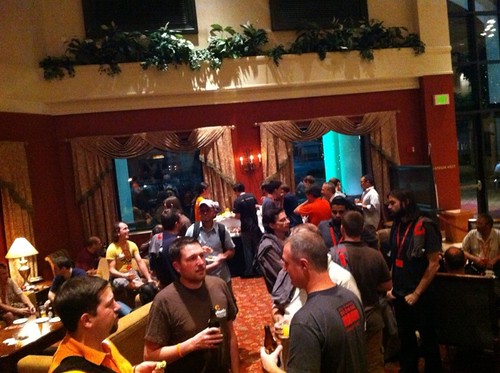I am pleased to announce the Design Summit Business Track held on Day 1 and 2 of the event next week. The Technical Track is being developed by the development community and will be run real-time at the event itself. Please note that last minute changes can and do occur with any event schedule so please understand that this plan is as close to final as possible.
Event registration is still open at http://openstack.org/register.
DAY 1 MORNING : General Session
General Session: The summit opening presentations provide a high level overview of the OpenStack project from the Chief Stacker as well as the latest insight from Rackspace and NASA on their contributions and plans. It is also a pleasure to welcome Joe Tobolski to present his views on the impact of OpenStack on enterprise computing. Finally, Jonathan Bryce offers insight into the Architecture Board, its new members, and role within the OpenStack community. Welcome to OpenStack Design Summit and please be sure to take advantage of all the networking opportunities as well as sessions planned for your benefit.
| Time | Speaker(s) | Topic |
|---|---|---|
| 9:00 – 9:30 | Jim Curry (OpenStack) | Welcome and State of OpenStack |
| 9:30 – 10:00 | Mark Interrante (Rackspace) | Rackspace and OpenStack |
| 10:00 – 10:45 | Jesse Andrews / Josh McKenty (Anso Labs) | NASA Nebula |
| 10:45 – 11:30 | Joe Tobolski (Accenture) | OpenStack in the Enterprise |
| 11:30 – Noon | Jonathan Bryce (OpenStack) | Architecture Board Overview |
DAY 1 AFTERNOON: Business of Clouds & OpenStack Community
Business of Clouds & OpenStack Community: The first half of this afternoon’s business track illuminates how cloud computing impacts business with a general overview from David Lemphers, Director of Cloud Computing at PWC followed by a real-world consolidation example from Christian Reilly at Bechtel. The afternoon sessions provide OpenStack community discussions, describing how our open source project is taking shape. These sessions are a chance for the community to discuss critical issues such as our trademark policy, our brand, and our community documentation.
| Time | Speaker(s) | Topic |
|---|---|---|
| 1:30 – 2:15 | David Lemphers (PWC) | Business Impacts of Cloud Deployments |
| 2:15 – 3:00 | Christian Reilly (Bechtel) | Why a Major Int’l Construction Company Needs a Cloud? |
| 3:00 – 3:30 | BREAK | |
| 3:30 – 4:00 | Stephen Spector (OpenStack) | OpenStack Trademark Policy Proposal |
| 4:00 – 4:30 | Mark Collier / Lauren Sell (OpenStack) | Building the OpenStack Brand Together |
| 4:30 – 5:00 | Anne Gentle (OpenStack) | Content Stackers |
DAY 2 MORNING: Deploying OpenStack
Deploying OpenStack Series: When you’re thinking of deploying an OpenStack Cloud there are plenty of decisions to make, from hardware purchases to software integrations. These sessions will answer questions like, “What if I just want to build a Proof of Concept… what’s the minimum recommended configuration? How much automation can I achieve at the bare metal level? What about networking? How do I integrate a private OpenStack cloud into my existing IT infrastructure from directory services to authentication?” Answer these questions and explore considerations with Martin Casado from Nicira Networks, Joe Arnold from Cloud Scaling, and Bret Piatt from Rackspace providing insight and guiding discussions.
| Time | Speaker(s) | Topic |
|---|---|---|
| 8:00 – 8:45 | Bret Piatt (OpenStack) | Deploying OpenStack: Background |
| 8:45 – 9:30 | Martin Casado (Nicira Networks) | Deploying OpenStack: Networking Considerations and Future Directions |
| 9:30 – 10:00 | BREAK | |
| 10:00 – 10:45 | Bret Piatt (OpenStack) | Deploying OpenStack: Compute |
| 10:45 – 11:30 | Joe Arnold (Cloudscaling) | Deploying OpenStack: Object Storage |
DAY 2 AFTERNOON: Extending OpenStack Community & Getting to Work
Extending OpenStack Community & Getting to Work: Presentations from Cloudscaling and Cloudkick provide a view on how service providers and user groups can work with the OpenStack community to benefit all involved. The business track concludes with a call to action from Jim Curry with key take-aways from these two days of sessions along with a short “next action” list of activities for attendees to start getting things done. Finally, let’s discuss the current OpenStack governance policy so that community members have an opportunity to mold the existing plan. At the end of day two, we’ll send you off to the unleash OpenStack community energy and build open standard clouds.
| Time | Speaker(s) | Topic |
|---|---|---|
| 1:30 – 2:15 | Andrew Shafer (Cloudscaling) | OpenStack and Service Providers |
| 2:15 – 3:00 | Alex Polvi (Cloudkick) | OpenStack User Groups |
| 3:00 – 3:30 | BREAK | |
| 3:30 – 4:00 | Jim Curry (OpenStack) | Call to Action: ENGAGE |
| 4:00 – 4:30 | Mark Collier (OpenStack) | OpenStack Governance Discussion |













